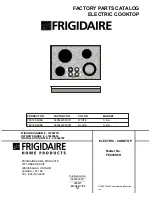
2
Be sure all packing materials are removed
from the appliance before operating it.
Keep area around appliance clear and free
from combustible materials, gasoline, and
other flammable vapors and materials.
If appliance is installed near a window,
proper precautions should be taken to
prevent curtains from blowing over burn-
ers.
Many aerosol-type spray cans are EXPLO-
SIVE when exposed to heat and may be
highly flammable. Avoid their use or stor-
age near an appliance.
Many plastics are vulnerable to heat. Keep
plastics away from parts of the appliance
that may become warm or hot. Do not
leave plastic items on the cooktop as they
may melt or soften if left too close to a
lighted surface burner.
To eliminate the hazard of reaching over
hot surface burners, cabinet storage should
not be provided directly above a unit. If
storage is provided, it should be limited to
items which are used infrequently and which
are safely stored in an area subjected to
heat from an appliance. Temperatures may
be unsafe for some items, such as volatile
liquids, cleaners or aerosol sprays.
A faint gas odor may indicate a gas leak. If a
gas odor is detected, shut off the gas supply
to the cooktop. Call your installer or local
gas company to have the possible leak
checked.
Never use a match or other
flame to locate a gas leak.
A
BOUT
Y
OUR
A
PPLIANCE
NEVER
use appliance as a space heater to
heat or warm a room to prevent potential
hazard to the user and damage to the appli-
ance. Also, do not use the cooktop as a
storage area for food or cooking utensils.
Potentially hot surfaces include cooktop,
and areas facing the cooktop.
NEVER
use aluminum foil to line burner
spillover area. Restriction of normal air flow
may result in unsafe operation.
C
OOKING
S
AFETY
Always place a pan on a surface burner
before turning it on. Be sure you know
which knob controls which surface burner.
Make sure the correct burner is turned on
and that the burner has ignited. When cook-
ing is completed, turn burner off before
removing pan to prevent exposure to burner
flame.
Always adjust surface burner flame so that
it does not extend beyond the bottom edge
of the pan. An excessive flame is hazardous,
wastes energy and may damage the appli-
ance, pan or cabinets above the appliance.
NEVER
leave a surface cooking operation
unattended especially when using a high
heat setting or when deep fat frying. Boilovers
cause smoking and greasy spillovers may
ignite. Clean up greasy spills as soon as
possible. Do not use high heat for extended
cooking operations.
NEVER
heat an unopened container on
the surface burner. Pressure build-up may
cause container to burst resulting in serious
personal injury or damage to the appliance.
NEVER
store items of interest to chil-
dren in cabinets above an appliance. Chil-
dren climbing on the appliance to reach
items could be seriously injured.
I
N
C
ASE
OF
F
IRE
Turn off appliance and ventilating hood to
avoid spreading the flame. Extinguish flame
then turn on hood to remove smoke and
odor.
•
Smother fire or flame in a pan with a lid or
cookie sheet.
NEVER
pick up or move a flaming pan.
Do not use water on grease fires. Use baking
soda, a dry chemical or foam-type extin-
guisher to smother fire or flame.
C
HILD
S
AFETY
CAUTION
T
O
P
REVENT
F
IRE
OR
S
MOKE
D
AMAGE
CAUTION
NEVER
leave children alone or unsuper-
vised near the appliance when it is in use or
is still hot.
NEVER
allow children to sit or stand on
any part of the appliance as they could be
injured or burned.
Children must be taught that the appliance
and utensils on it can be hot. Let hot utensils
cool in a safe place, out of reach of small
children. Children should be taught that an
appliance is not a toy. Children should not
be allowed to play with controls or other
parts of the unit.
NEVER
leave any items on the cooktop.
The hot air may ignite flammable items
and may increase pressure in closed con-
tainers which may cause them to burst.




































